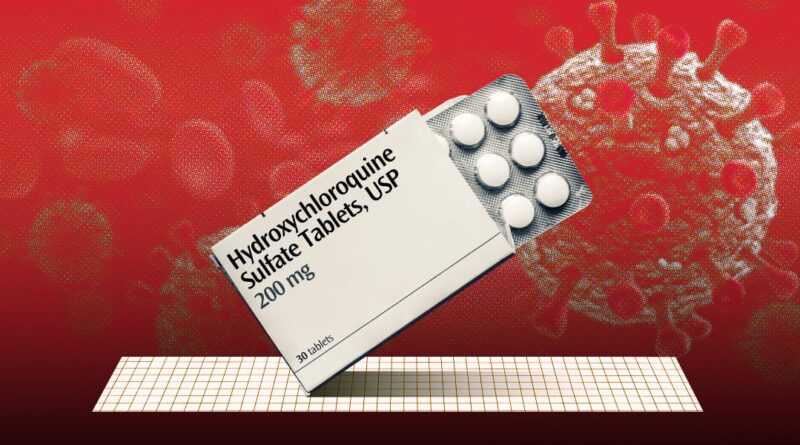What You Need to Know Now About Hydroxychloroquine
ADDED medicine that turns into a lot of money quickly, only to exit quickly. Remember hydroxychloroquine? The drug caused a lot of controversy at the beginning of the epidemic, when some people – including the then president, Donald Trump, said that hydroxychloroquine could reduce the risk of contracting Covid.
But the medical community insisted at the time that the drug, commonly used to treat malaria, would not prevent people from contracting Covid. A lot has changed since 2020, including research into effective treatment for the virus. With Trump now president-elect, things like hydroxychloroquine are on the rise again.
So, where does hydroxychloroquine fall now in terms of Covid? Here is the price.
What else is Hydroxychloroquine?
HYDROXYCHLOROQUINE E IN a class of prescription drugs called antimalarials, according to the US National Library of Medicine. It is also sold under the brand name Plaquenil.
“Hydroxychloroquine works by changing the pH in tiny compartments inside your cells called lysosomes,” explains Jamie Alan, Ph.D., associate professor of pharmacology and toxicology at Michigan State University. “Lysosomes work to degrade or break down proteins in our cells.” Hydroxychloroquine specifically makes those small particles more acidic, which causes more protein breakdown, he says.
What does hydroxychloroquine treat?
CONSIDERING HYDROXYCHLOROQUINE an anti-malarial drug and an osteoporosis drug, offering several potential applications.
The biggest use for hydroxychloroquine is to treat or prevent malaria, which is a dangerous viral infection spread by mosquitoes, according to the US National Library of Medicine. Hydroxychloroquine is also used to treat other diseases and health conditions, including many forms of lupus and rheumatoid arthritis.
“In people affected by malaria, hydroxychloroquine works inside the red blood cells to kill the malaria parasites that cause the disease,” says Kelly Johnson-Arbor, MD, a toxicologist at MedStar Health. “Hydroxychloroquine also works on the human immune system to cause anti-inflammatory effects, which is why it is used to treat lupus and rheumatoid arthritis.”
OK, so why do people think it can prevent Covid?
HERE’S THE THING find arguments. “In test tube and animal studies, hydroxychloroquine has been found to have some antiviral and antibacterial activity,” Dr. Johnson-Arbor says.
Meaning, the idea of using hydroxychloroquine to prevent Covid was just out of left field – and it’s important to remember that there was no treatment for the virus at the time, leaving people scrambling to do what they could that can keep them safe. “Because it helps regulate the immune system, and because of its potential antiviral effects, hydroxychloroquine was studied as a potential treatment for Covid-19 infection,” Dr. Johnson-Arbor says.
Unfortunately for those excited about hydroxychloroquine, research on real people has not been completed.
Can hydroxychloroquine help reduce the risk of contracting Covid?
NOT FOLLOWING SCIENCE. Dr. Johnson-Arbor cites a “significant” study published in New England Journal of Medicine in 2020 found that hydroxychloroquine was not an effective treatment for hospitalized people with Covid infections. Another trial found that hydroxychloroquine was ineffective in preventing Covid-19 in healthcare workers who were exposed to the virus.
And another study found that hydroxychloroquine was ineffective in preventing people who had been infected with Covid from being hospitalized with the virus.
“Based on the results of these and other studies, at this time there is no evidence that hydroxychloroquine can prevent or treat Covid infection in humans,” Dr. Johnson-Arbor says.
In fact, some early clinical trials in people with Covid who took hydroxychloroquine also found that those patients had a higher risk of dying from the virus compared to those who did not take the drug.
“It hasn’t been shown to work in humans as a cure or prophylaxis for Covid,” says infectious disease expert Amesh A. Adalja, MD, a senior fellow at the Johns Hopkins Center for Health Protection. There is one thing to keep in mind, according to Alan: “There are side effects associated with this drug.”
These include something called QT prolongation, an abnormal heart rhythm that can lead to a fatal arrhythmia called Torsades de Pointes. “Other side effects can include an increased chance of infection, changes in vision, depression and thoughts of harming yourself, painful rashes, nerve problems, a decrease in all blood cells, which can be fatal, and muscle aches and pains to name a few,” Alan says. There is no cure for taking too much hydroxychloroquine, which makes it a tricky drug to overdose on, says Dr Johnson-Arbor.
In fact, Dr. Adalja says it’s not a good idea to take hydroxychloroquine if you don’t need it.
Now, there are several strategies to prevent Covid, including multiple vaccinations and Pemgarda, a monoclonal antibody treatment that can be given to people over 12 years old with moderate or severe infection.
So, doctors do not recommend taking hydroxychloroquine to reduce the risk of Covid. “There is a risk in taking hydroxychloroquine for Covid-19, and there is no benefit in Covid-19 according to the available data,” Alan says.
#Hydroxychloroquine
